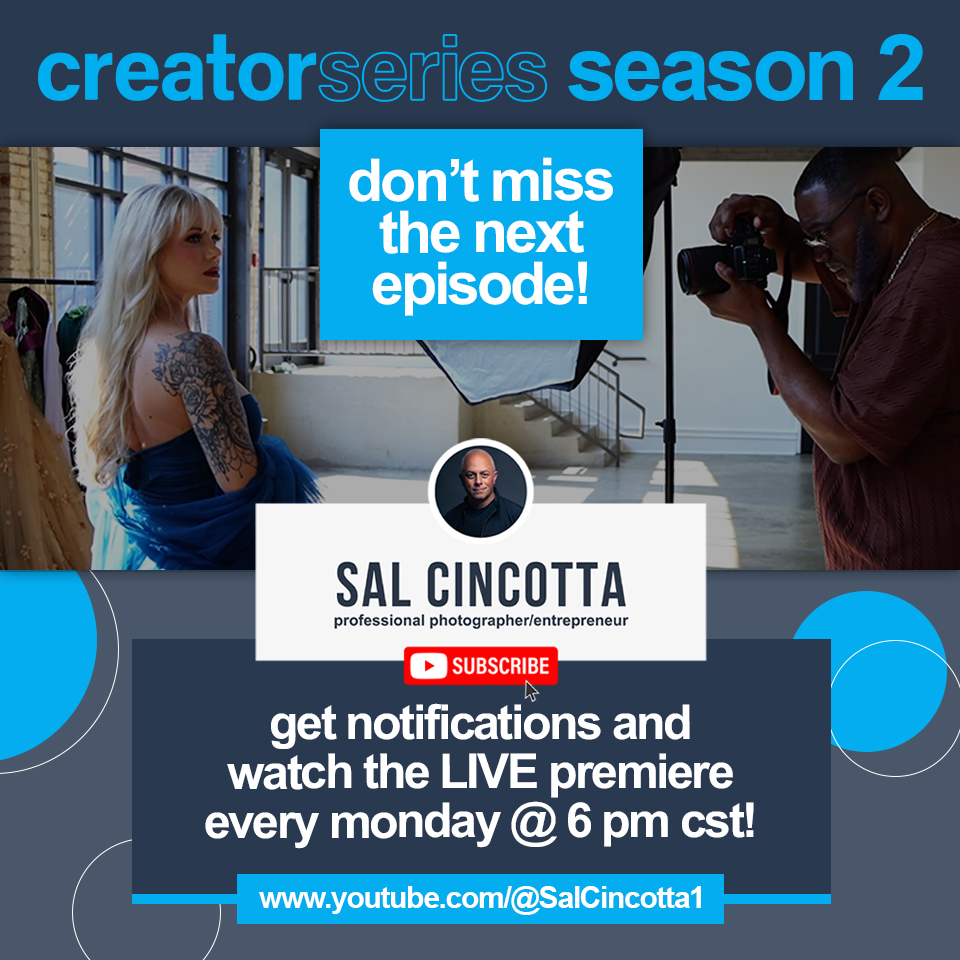An Interview with Momma C: The Woman Who Made the Man with Jeff & Lori Poole
For the Anniversary Issue, we’re taking a break from The Business Corner to explore what makes the Shutter world so great. This month, I wanted to interview Momma C. You may have seen Sal’s behind-the-scenes photos of Momma C’s portraits, but he had no idea they were for this interview!
Here’s the backstory: When I do something in my own life that my mom is proud of, she always reminds me, “Don’t forget—I made you!” While on the surface, it’s a silly joke between her and me, it has planted this reverence in my mind. Mothers (and fathers) shape who we are. The mothers of great people must be great themselves. It is with that idea in mind that I approached Shutter’s ultimate den mother: Terri Cincotta, affectionately known as Momma C.
So here it is. An interview with Momma C: The Woman Who Made the Man.
-Lori
First things first: Momma or Mama?
Momma.
Tell us your backstory.
I was born and bred in Brooklyn. After graduating high school, I worked on Wall Street. I had Sal when I was 20. I remember when I held him, I made a promise to him. I was going to take care of him and raise him the best way I could. I stayed home with him for five years and enjoyed every minute of it. I wouldn’t change one bit of that time in my life.
Sal started first grade at private Catholic school. Giving him an education was paramount. I believe that’s the most important thing you can give your children: the tools with which to take care of themselves. It came before vacations. It came first. As a parent, I knew that kids will go one of two ways. I can pay my money to tuition, or to a lawyer. I wasn’t about to let somebody control my life or his life.
I continued to work on Wall Street until 1989. Eventually I did real estate in Ulster County, New York for 20 years. When the market crashed, I decided to move to St. Louis.
What is the greatest thing you learned from your own mother?
My mother came here from Lebanon when she was 16 or 17. She could speak multiple languages and came to this country when she was so young. There weren’t very many jobs for women during the Depression. So she worked in a factory and did beautiful embroidery. Sal and I still have some of her pieces.
She taught me to appreciate everything, to treat everyone fairly, to give back to your community. She was a God-fearing woman who taught me to always have integrity and honesty. You could have all the money you want. But if you don’t have any values or morals or ethics, you have nothing. I have those things, and I know I’ve passed them down to my son. I’m grateful that she was my mother. I attribute every quality I have to her.
What is your version of success? Of failure? How did you model success for Sal?
When I worked on Wall Street, I used to have to stay late many nights, until 11:00 or 12:00. I did it because I needed the paycheck. My focus in life was being a good mom. And if I had to put in those hours, fine, but I didn’t put in those hours every day, nor did I compromise my time with him.
Sal had to participate in whatever went on in the house. For example, we went food shopping for us and my mother on Friday nights. One night, he told me he didn’t want to go. When I came home, he asked for his snacks, and I told him they were at the store. And he just kind of looked at me, but he got it. He never sent me out alone again.
As a photographer, you can go shoot your pictures all day long. But if you want to create a business, you’re doing that at night behind the scenes. When you’re starting out or even when you’re established, you can’t afford a high-priced back office. People want to reap the benefits without putting in the time. That is one thing I did teach him: You’re not getting anywhere in life with a shortcut. It just doesn’t happen.
Sal’s version of success works for him. He’s up at two in the morning wondering what else he could do, what other business he could get into. He loves every minute of it. There’s nothing about what he does that he doesn’t like. He’s on his own mission, and everybody around him follows. And still, nobody handed him anything.
When Sal was young, what did you think he was going to be? Tell me about some of the businesses he started as a child.
I would come home from work, and Sal would be going a mile a minute. “Mom! Mom, Mom. Can you buy this for me? It’s a private investigator course.”
And I said, “What are we going to do with that?”
I never ever dismissed what he asked me. I always gave him a hundred percent of my time. I told him, “Go in your room. Make me a list of pros and cons. Then come back and we’ll discuss it.”
So he went to his room and came back out with a list of pros and cons. He was very honest with the cons. The kit was a hundred bucks—a lot of money 40 years ago. I agreed to get it and I didn’t threaten. However, I thought to myself that if I got it and he didn’t even look at it, it will have been money well spent. I’ll never do it again. But I got it, and he did master it.
When Sal was 11, he was delivering groceries. He usually went by himself to pick up his paycheck, but this one day I went with him. The owner said to me, “You know, I never see him.”
I said, “Excuse me, doesn’t he work here?”
He said, “No, he subcontracts it out.”
So we get outside, and I asked Sal, “What do you do?”
He said, “Well I get the pay; they get the tips!”
It was crazy to watch him at that age, to see how his mind worked and how he was going to make money.
At age 14 or 15, he decided he wanted to take a real estate course. He actually made appointments with realtors to go look at property. Although they wouldn’t take him seriously because he was a kid, I knew that he was learning about business.
I always knew he was going to do something. He was never going to sit still.
Sal is quite candid about challenges he faced as a child. Fist fights, trouble with school, overcoming being poor, promises made to his father to “do well.” He also credits you as the “Alpha-Female” who encouraged him to dream.
I was very, very strict. Action/reaction: This is what you do, this is what you get. I don’t know another way to be. I never let up.
I don’t believe that any parent should kill their child’s spirit. I think children are wonderful little human beings that require a lot of patience and time. Just because you don’t like what they’re doing doesn’t mean you should crush it. But I am also a firm believer that there are parameters that should be set.
I think it’s hard to be a parent. He challenged me every day.
Sal says that his loved ones accept him, even if they don’t understand him. As a mother, what are some of the difficulties of having an entrepreneurial child? Were you ever tempted to encourage him to stay in corporate America to avoid risk?
He went to work right from college. He had a series of great jobs, from Proctor & Gamble to Microsoft. So one day, he called me up in New York and he said, “I’ve made a decision. I am quitting Microsoft. I want to be a photographer.”
And I promise you there was silence on the phone before I said, “Are you out of your effing mind? You’re giving up six figures, a pension plan, stock options … for what?” I could not wrap my head around it.
He said, “This is what I want to do. I’ll make it work.”
We have that kind of relationship where he’s going to tell me something, I’m not necessarily going to agree with him, but I’ll support him.
What is one of your favorite memories with your son?
I was selling real estate in upstate New York when the market plummeted. I just wanted to get out of Dodge. He had been nagging me for seven years to move out to Saint Louis. He would keep me on the phone for an hour telling me about all the pluses of moving here, and I was like, “Who the hell wants to live in the Midwest?”
He said, “Don’t come here when you’re in a wheelchair. I want to enjoy you.” It was such a touching time. So I finally made the decision. But I was so overwhelmed with selling the house, moving here, finding a place to live. It was so nice to have that person to call up and ask for help. When I look at him, sometimes I see the little boy. To get to a point in your life where you can let go and let somebody else handle it … It was a “wow” moment for me.
What do you think the turning points or most influential experiences have been in your life?
One was becoming a mom, and the other was losing my mom. Those two things really affected me so deeply that it just gave me such an appreciation for life.
Every time somebody important in your life dies, along with them go all the memories you had with them. And there’s nobody else you could share a memory with. You can share the story, but not the memory.
After your mother dies … Nobody loved you as much as your mother. Once your mother dies, you realize there’s nobody on the face of the Earth who loves you that much.
And Sal is the only person who loves me that much. Realizing that I could call him any time, and he’ll be there. Even when we’re arguing. Or “disagreeing,” because we don’t argue.
He’s a gift. I wish everybody had a child like that. He would be the same way whether he was successful in business or not. We’re just always very close.
When and how did you make the decision to work for Team C? What is it like, working with your son?
When I first moved here, I stayed home, and I wasn’t happy. So he said, “You’ve got to come to work, Mom.” He made me work here. I do the books. My son can’t afford me, Lori. He can’t afford all the work I do for him. I just tell him how friggin’ lucky he is all the time.
He’s a pain in the ass! Absolute pain in the ass. But I also am a pain in the ass to work for. He was my partner in my real estate company in New York. We both have that Type A personality. We have the same kind of work ethic.
But that’s why ShutterFest is so successful. It’s so detailed, and it’s amazing to think that a staff of five or six people can pull that off. It’s crazy. It’s ludicrous.
But he’s very kind. When I come in the office, I get a kiss and a hug every day. And when I leave, I get another kiss and hug. It doesn’t matter, even if he’s in a meeting. He always gets up and always says I love you when I’m on my way out the door. He includes me in everything. I’m very, very fortunate and blessed. How many kids want their mom around forever?
This is the Anniversary Issue—a celebration of accomplishments. Is there anything you want to say to Sal, but never have?
Actually, I tell him on a regular basis how much I love him. I’m so proud of him. I’m proud of the person he is more than the business he’s built. I’m proud of his energy and proud of the goodness that I see in him. I tell him every day.
What are your final thoughts?
So much devotion and love go into being a mom. The rewards of seeing your child grow into a wonderful person are priceless.
I turn 70 this year, and God has been really good to me. I’m so lucky. I could do a happy dance.




